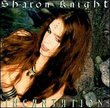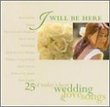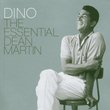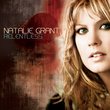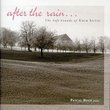| All Artists: Alfredo Bernardini, Sergio Ciomei, Johann Sebastian Bach, Fabio Biondi, Europa Galante Title: JS Bach: Violin Concertos - Fabrio Biondi/Europa Galante Members Wishing: 1 Total Copies: 0 Label: EMI Classics Release Date: 1/11/2000 Genre: Classical Styles: Chamber Music, Forms & Genres, Concertos, Historical Periods, Baroque (c.1600-1750), Classical (c.1770-1830), Instruments, Reeds & Winds, Strings Number of Discs: 1 SwapaCD Credits: 1 UPCs: 724354536120, 724354536151 |
Search - Alfredo Bernardini, Sergio Ciomei, Johann Sebastian Bach :: JS Bach: Violin Concertos - Fabrio Biondi/Europa Galante
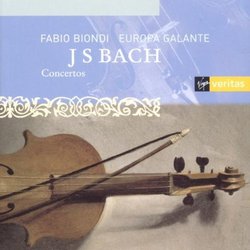 | Alfredo Bernardini, Sergio Ciomei, Johann Sebastian Bach JS Bach: Violin Concertos - Fabrio Biondi/Europa Galante Genre: Classical
Bach, like most Baroque composers, regularly adapted music that he had written previously for one context to be reused in another. For example, he adapted various movements from his cantatas for the Mass in B Minor; he... more » |
Larger Image |
CD DetailsSynopsis
Amazon.com Bach, like most Baroque composers, regularly adapted music that he had written previously for one context to be reused in another. For example, he adapted various movements from his cantatas for the Mass in B Minor; he reworked several of his trio sonatas for viola da gamba and keyboard; and he transcribed his Violin Concerto in E Major for harpsichord and strings. It has long been presumed that most of Bach's harpsichord concertos were composed originally for other solo instruments; latter-day musicians have back transcribed, as it were, a number of those concertos. Several of these transcriptions, along with the harpsichord version of the E Major violin concerto, get delightful performances on this release from charismatic violinist Fabio Biondi and his period-instrument ensemble Europa Galante. The transcriptions of the G Minor and D Minor harpsichord concertos seem quite credible; the transcription for violin and oboe of the C Minor Concerto for two harpsichords is even better, the soloists' lines being much clearer than is the case with two harpsichords tinkling away at each other. Biondi plays with more vibrato and more legato--in a more "Romantic" style, one might say--than most Baroque violinists; in some of the slow movements, he sounds almost like... well, if not Isaac Stern, then perhaps the young Yehudi Menuhin. It's as if he's the period-instrument violinist for those who never got used to the sound of period instruments. Yet Biondi plays with imagination and charisma, and Europa Galante (which does make a period-instrument sound) plays with the sparkling energy that seems to be the trademark of Italy's best Baroque groups. The recorded sound, unfortunately, is a bit flat and constricted; while this is a real shortcoming, it's not so serious as to prevent a warm recommendation for the excellent performances. --Matthew Westphal Similarly Requested CDs
|
CD ReviewsA Bach and Biondi Favorite Alan Lekan | Boulder, CO | 11/11/2005 (5 out of 5 stars) "If you are looking for Bach's "original violin concertos" (BWV 1041-1043), these are not them. What is on this CD are concertos "reconstructed" from some of Bach's later harpsichord concertos. Behind this reconstruction is the presumption that Bach's keyboard concertos were all transcribed from earlier violin concertos (a common practice of that era). But, for the concertos featured on this disc, there are no surviving original violin concertos - hence the need to work backwards and "reconstruct" the assumed violin part. Such a change of soloist instrumentation brings one advantage: the violin's supreme, vocal expressivity over the leyboard, particularly in the slower, aria-like movements. So, with this role-reversal, the violinist in the driver's seat - which, in the case of period-virtuoso Fabio Biondi - sets the stage for something promising to come. One might expect upon seeing Fabio Biondi as lead violin, music full of high drama and adrenaline like his Vivaldi recordings. But, while some of that energy is here in the allegros, the music overall here has a more elgant, richly melodic and even sometimes contemplative mood to it that is most fitting to the period and composer. Most notable is Biondi's characteristic equiste shaping of the music, with a joyful and sensuous tone that make for an attractive listening experience. Few can match his gorgeous and expressive "singing style" which finds a perfect match in the slow, aria-esque movements. The adagios and largos are taken at just the right pace and are truly beautiful to behold (the G minor largo can sing you to sleep). And no work is more melodically-alluring than the Concerto for Violin and Oboe which features a most gentle and soaring dialog between the two lyrical soloists in the Adagio. Fabio Biondi's sweet, honeyed tones like this can truly spoil one and change your conceptions of "period instruments." Equally, Biondi's wonderfully articulated bowing in the D minor Allegro solo is equisite and compelling, creating an ethereal tremolo effect that is mesmerizing. The spirited allegros have just the right amount of verve and pace without forgetting this is Bach and not Vivaldi. The harpsichord concerto BWV 1054 is also quite satisfying, having a perfectly judged tempo and an upbeat - yet relaxed - feel to it that makes it a frequent favorite. The Europa Galante are an equal star in the set and sound marvelous with their smaller Baroque orchestra that brings a more intimate, chamber-like feel to the music. I really liked this aspect as likely will others who prefer chamber-music dynamics over full symphonies. Overall, there is a nobility and poise in their playing here that is not rushed, but yet communicates depth and passion. It is most refreshing music. Last, I found the sound quality to be full, clear, balanced - one of the better ones I have from Veritas - so I cannot agree with the lead review citing a deficiency. In short, this is a fairly unique approach and recording of some Bach Concertos full of stylish yet refined playing in a smaller chamber-like setting. I have a lot of CD's of Bach by many groups and many from the Europa Galante, but this one became a surprize favorite. Five stars." Wrong Language Giordano Bruno | Wherever I am, I am. | 11/11/2007 (3 out of 5 stars) "This is the only performance I've ever heard by Europa Galante that I didn't much like, and the first time I've ever objected to Fabio Biondi's "operatic" affect. All the flamboyant turns and attention to musical "surface", which make Biondi's performances of Italian music so convincing, here seem to get in the way of Bach's deep contrapuntal integration. I especially dislike the two concerti assigned to the oboe, which is odd because Bach made spectacular use of the oboe in many of his best cantatas. One previous reviewer who like the oboe pieces said essentially that it made the melodic line more distinct; perhaps that's what I DON'T like. In Bach, all lines are melodic lines.
But after all, this is Bach! Played by very skilled artists! So I can't give the disk less than three stars. I will, nevertheless, resell it." |

 Track Listings (12) - Disc #1
Track Listings (12) - Disc #1